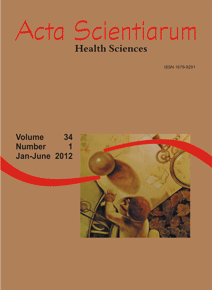<b>Avaliação cognitiva de idosos institucionalizados</b> - doi: 10.4025/actascihealthsci.v34i1.7974
Resumen
No Brasil, a institucionalização do idoso ocorre quando ele apresenta baixos níveis de dependência e um dos fatores que leva a isso é o comprometimento cognitivo. Assim, este estudo teve por objetivo avaliar o estado cognitivo de idosos residentes em Instituição de Longa Permanência (ILP), Londrina, Estado do Paraná, detectando possíveis perdas cognitivas, reafirmando diagnóstico prévio de demência e subsidiando o desenvolvimento de atividades lúdico-pedagógicas. O instrumento aplicado na avaliação cognitiva contemplava questões socioeconômicas, demográficas e psicológicas. O estado cognitivo dos idosos foi verificado por meio do Mini-Exame do Estado Mental, associado a uma escala de Atividades Básicas de Vida Diária (AVD) de Katz. Os pontos de corte utilizados no MEEM foram diferenciados pela escolaridade. Da população de 44 idosos, residentes na instituição, foi possível realizar os testes de avaliação do estado cognitivo em 28, desses 39,3% apresentaram comprometimento cognitivo, valor aumentado para 71,4% quando aplicado ponto de corte padrão. Todos os indivíduos demenciados submetidos aos testes cognitivos apresentaram escores baixos. Assim, exercícios que envolvam a atenção, concentração, pensamento lógico e memória, necessitam ser empregados a fim de preservar a capacidade funcional do indivíduo que envelhece, valorizando sua autonomia.
Descargas
DECLARAÇÃO DE ORIGINALIDADE E DIREITOS AUTORAIS
Declaro que o presente artigo é original, não tendo sido submetido à publicação em qualquer outro periódico nacional ou internacional, quer seja em parte ou em sua totalidade.
Os direitos autorais pertencem exclusivamente aos autores. Os direitos de licenciamento utilizados pelo periódico é a licença Creative Commons Attribution 4.0 (CC BY 4.0): são permitidos o acompartilhamento (cópia e distribuição do material em qualqer meio ou formato) e adaptação (remix, transformação e criação de material a partir do conteúdo assim licenciado para quaisquer fins, inclusive comerciais.
Recomenda-se a leitura desse link para maiores informações sobre o tema: fornecimento de créditos e referências de forma correta, entre outros detalhes cruciais para uso adequado do material licenciado.























5.png)







